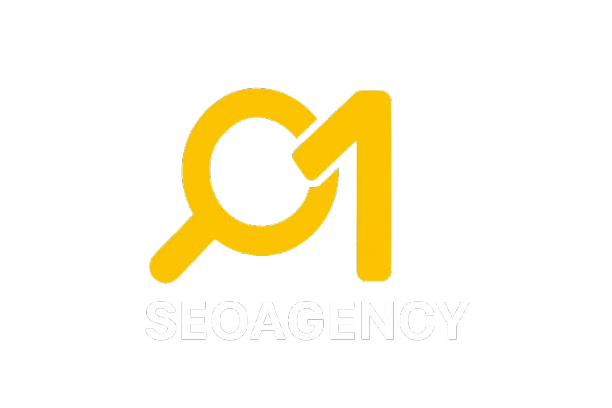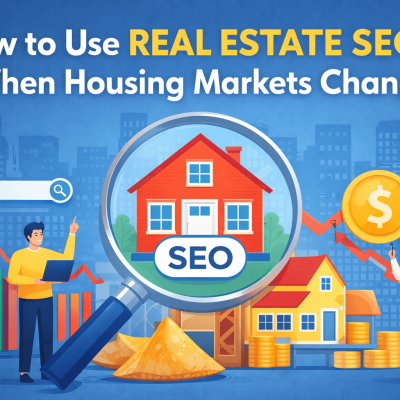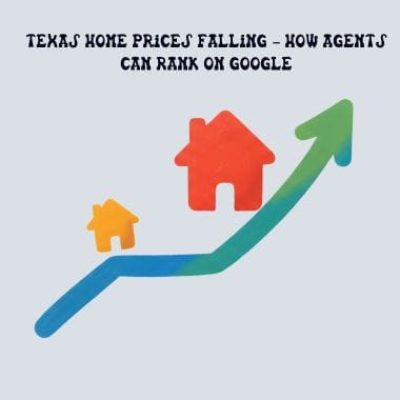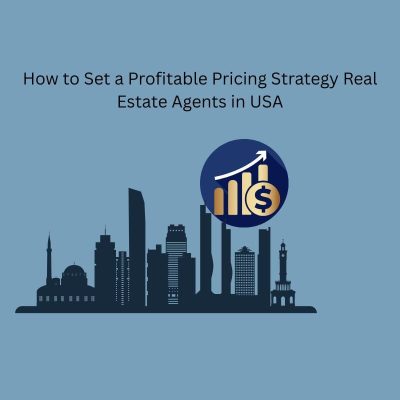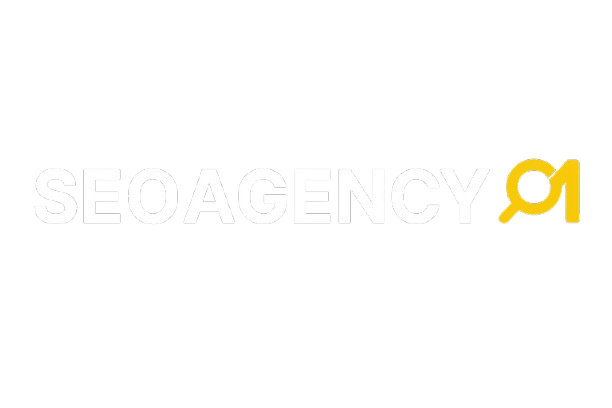Today, most searches for commercial property begin online. The challenge is no longer just having space to offer—it’s making sure potential tenants or buyers can find you.
Without a strong online presence, even the best properties can be overlooked.
Effective marketing solves this by connecting your buildings with the right audience. It’s about attracting qualified leads: principals, investors, and tenants who are actively searching for what you provide.
A strategic approach to SEO lays the groundwork for these connections. It ensures your company appears when it matters most, turning search traffic into valuable business opportunities.

How to Generate More Commercial Real Estate Leads Online
Does it feel like your amazing office space or retail property is invisible? You’ve got a great listing, but the phone just isn’t ringing. In today’s market, this means missed rent and lost sales.
Filling vacancies is crucial for maintaining your property’s value and cash flow.
Understanding Modern Tenant and Investor Search Habits
Gone are the days of just a “For Lease” sign. Potential tenants and buyers start their journey online.
They search for terms like “industrial space for rent [City]” or “office building for sale.” If your property doesn’t appear in these results, you’re missing a huge opportunity.
Traditional marketing like brochures can’t reach people at this early, critical stage.
The Simple First Step to Get Found
Your website is the most important tool. Create a separate and informative page for each property.
Don’t just list the size and price.
Add more content: high-quality photos, video tours, and PDF brochures.
Showcase the neighborhood: explain why this location is great for business.
Example: Instead of just writing “123 Main St.”, use a title like:
“Modern Retail Space for Lease in Downtown Seattle”
This title matches exactly what a shop owner would type into Google.
That way, your site becomes a helpful resource, not just an ad.
Comparing Your Lead Generation Options
It’s smart to know which strategies give you the best return for your effort. Here’s a quick look at two common approaches.
| Method | Pros | Cons |
|---|---|---|
| Traditional Marketing (Signs, Print Ads) | Works for local foot traffic, feels tangible. | Hard to measure, limited reach, can look outdated. |
| Digital SEO Strategy | Targets active searchers, works 24/7, results are measurable. | Takes consistent effort to build and maintain. |
The best strategy uses both. A “For Lease” sign catches local eyes, while a strong online presence captures the serious investors searching from anywhere.
Technical SEO: Building a High Performance Foundation
Is your commercial real estate website beautiful but invisible to investors and tenants searching online? You’ve spent a fortune on professional photos and detailed listings, yet the phone just isn’t ringing.
This is a common and frustrating problem. Getting this right is critical because even the most amazing property won’t lease or sell if potential clients can’t actually find it when they search.
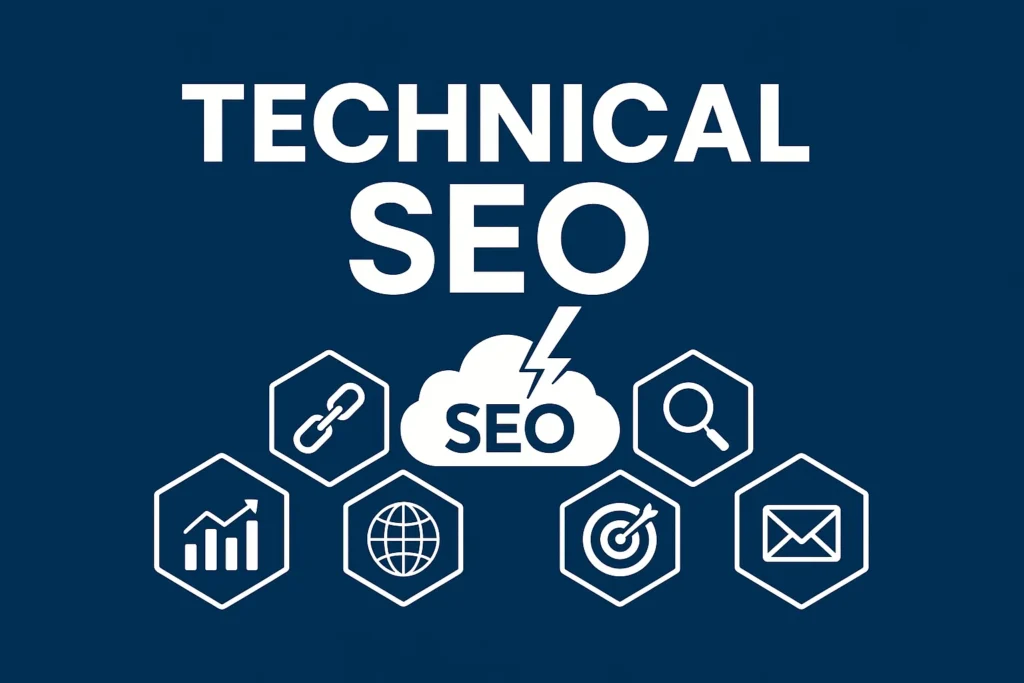
How to Improve Site Speed for Better User Engagement
A slow website tells a busy investor two things: your property is outdated, and you don’t value their time. They will leave instantly.
Compress your images. Use tools to reduce file sizes before uploading them.
This is the easiest win for most sites.
Choose a specialized hosting provider. Don’t use cheap, shared hosting. Invest in a platform built for speed and security.
Think of it like building signage for a physical property. If the sign is faded and hard to read, people will drive right by. A fast, clear website is your perfect digital sign.
Mobile-Friendly Design for On-the-Go Decision Makers
Your clients are reviewing properties on their phones between meetings. If your site is difficult to navigate on a small screen, you’ve lost them.
| Pros | Cons |
|---|---|
| Reaches busy, decisive clients anywhere. | Frustrates users and increases bounce rate. |
| Creates a professional, modern impression. | Makes your brand look outdated and careless. |
Building a Logical Website Structure for Large Portfolios
A confusing website is like a messy filing cabinet; even if the information is inside, nobody can find it. For sites with many properties, a clear structure is non-negotiable.
Group properties logically by type, location, or status. This makes every listing easier to find.
Implementing Schema Markup for Commercial Listings
For a commercial property, this code can specify the square footage, lease type, and location.
This helps your listings stand out in search results with rich, detailed information that grabs a searcher’s attention immediately. It’s like giving Google a perfect, structured fact sheet about each of your properties.
Content Strategy, Commercial Real Estate Authority
Does your commercial real estate website feel invisible to potential investors or tenants? You’re creating content, but it’s not bringing in the right leads.
Standing out online is tough, but it’s crucial for building your authority and closing more deals. A smart content strategy makes your firm the first place people turn to for trusted information.
How to Build Authority in Commercial Real Estate with Content
To truly become an expert resource, you need to move beyond random blog posts. A strategic approach focuses on the specific questions your clients are asking.
Developing Topic Clusters for CRE Niches
Instead of writing about one general topic, create groups of content that cover all aspects of a subject. This shows search engines you are a comprehensive expert.
- Central Pillar Page: A main guide on “Investing in Industrial Real Estate.”
- Cluster Content: Related blog posts linking to the main guide, like “Benefits of Warehouse Logistics Spaces” or “How to Evaluate Industrial Zoning Laws.”
This structure helps your website rank better and keeps readers on your site longer.
Targeting Commercial Buyer Search Intent
Your content must answer the exact questions of people searching online. Are they looking to learn, or are they ready to buy? Creating educational content builds trust with clients early in their journey.
- For Investors: Write clear guides on complex topics. A post like “How to Calculate Cap Rate for Multi-Family Properties” provides real value.
- For Tenants: Offer practical advice that makes their job easier. A resource like “Top Office Lease Negotiation Tips for Tenants” positions you as a helpful partner.
Here is a simple way to think about matching content to your client’s needs:
| Client Type | Their Question | Perfect Content Example |
|---|---|---|
| An Investor | “Is this retail strip mall a good investment?” | A detailed guide on “Evaluating Retail Property ROI” |
| A Business Owner | “How can I avoid bad clauses in my lease?” | A checklist on “Hidden Costs in Office Leases” |
Start by picking one niche you know well, like retail properties. Then, write a cornerstone guide on that niche.
Next, brainstorm five blog posts that answer specific questions related to that main guide. This focused method proves your expertise and attracts serious clients to your business.
Local SEO for Commercial Real Estate:
Struggling to get your commercial real estate listings in front of the right local buyers? It’s incredibly frustrating when a perfect property sits empty because local businesses don’t know it exists. Filling vacancies faster is crucial for maximizing your profits and building a strong reputation in your city.
This is where SEOAgency1 USA can make a real difference. By using smart local SEO strategies, they help your listings appear when buyers and tenants search online.
Instead of relying only on signs or print ads, your properties get visibility right where people are looking Google searches, maps, and real estate queries.
With clear listing pages, optimized keywords, and engaging content, SEOAgency1 USA ensures your properties attract the right audience and generate more qualified leads.

How to Improve Local Visibility for Real Estate Companies
The best place to start is by claiming your spot online. Your Google Business Profile is your digital storefront.
Optimizing Your Google Business Profile for CRE Firms
Make sure your profile is complete and accurate. Use clear, specific categories like “Commercial Real Estate Agency” and “Real Estate Consultant.” In your description, naturally include the neighborhoods and types of property you specialize in, like “downtown office space” or “industrial warehouses in [City Name].”
- Always choose the most specific category available.
- Use local keywords that a client would search for.
- Post regular updates about new listings, open houses, and market reports.
Managing Listings, Q&A, and Reviews for Brand Reputation
Your online presence builds trust. Actively respond to every review, both positive and negative. Answer questions in the Q&A section quickly and helpfully. This shows you are engaged and reliable. For example, if someone asks about zoning for a retail space, a detailed answer positions you as the local expert.
Showcasing Property Photos and Portfolio Highlights
A picture is worth a thousand words. Upload high-quality photos of your best properties, both inside and out. Create photo albums for different property types, like “Modern Office Buildings” or “Recent Retail Leases.” This visual proof is far more powerful than a text description alone.
Building a Consistent Citation Profile Across the Web
Your business name, address, and phone number (NAP) must be identical everywhere online. Inconsistent information confuses both customers and search engines, hurting your local ranking.
Directory Listings for Real Estate Companies
| High-Quality Directories | Lower-Quality Directories |
|---|---|
| Accurate listings on sites like Bing Places, Apple Maps, and Yelp. | Obsolete or spammy websites with outdated info. |
| Industry-specific sites like LoopNet or CoStar. | General directories that are not relevant to real estate. |
| Local Chamber of Commerce websites. | Sites that create duplicate listings you can’t control. |
Focus your energy on the high-quality sources first. This consistency tells Google your information is trustworthy.
Localized Link Building from Area Businesses and Associations
Build relationships with other local businesses. You could sponsor a community event, and their website might link to yours.
Or, you might write a helpful article for your local business journal about commercial market trends. These local links are votes of confidence in your authority.
Start by fully optimizing your free Google Business Profile today. It is the single most effective step to attract more local clients.
How to Build Authority with Link Building for Commercial Real Estate
Does it feel impossible to get noticed online? Many commercial real estate (CRE) professionals struggle to stand out in a crowded digital space.
Establishing a strong online presence is crucial because it builds trust with potential investors and clients, directly leading to more deals and opportunities.
Effective Outreach Strategies for High-Value Backlinks
Creating great content is only the first step; you need the right people to see it. Strategic outreach means connecting with website owners to earn valuable links back to your site. This process builds your site’s authority in the eyes of search engines.
- Research and identify reputable industry websites that your target clients already read and trust.
- Personalize every email you send. Mention a specific article they wrote and explain why your content would benefit their audience.
- Offer genuine value, not just a request for a link. Think of it as starting a professional relationship.
Earning Links from Commercial Real Estate News Sites
Industry news sites are always looking for credible data and expert insights. You can become a source they rely on.
- Submit newsworthy press releases about significant company achievements, major property acquisitions, or market reports you’ve published.
- Provide data-driven commentary on current market trends. A unique quote from you can earn a valuable brand mention and link.
Partnering with Financial Institutions and Business Brokers
These organizations serve the same audience you do. A partnership can be mutually beneficial for generating leads.
- Offer to write a guest article for their blog on a topic like “Financing Options for Industrial Properties” or “The Broker’s Guide to Tenant Improvements.”
- Co-host a webinar on a subject that helps your shared clients, such as market forecasting. They promote you to their audience, and you gain authority.
Using Public Relations for Digital Brand Mentions
Digital PR is about getting your brand talked about online, even without a direct link. These mentions still boost your reputation and discoverability.
Leveraging Company News and Project Launches
Never assume people will automatically find your news. You have to tell them.
- Announce major milestones. Did you just lease a major retail space? Secure a new anchor tenant? This is news. Package it into a short, compelling story and share it widely.
- For example, a short press release titled “Local Firm Secures $50M Investment for Downtown Redevelopment” is far more likely to be picked up than a simple social media post.
Contributing Expert Commentary to Industry Publications
Position yourself as a thought leader by sharing your knowledge. This is one of the fastest ways to build credibility.
- Pitch article ideas to editors of top CRE blogs or magazines. Focus on solving a common problem their readers face.
- Write a bylined article on a topic you know deeply, like the future of office space or investing in multifamily housing. This showcases your expertise and earns a powerful author bio link.
| Pros vs. Cons of Different Link Building Methods |
| :— | :— |
| Method | Pros & Cons |
| Guest Posting | Pro: Builds relationships and targets a specific audience.
Con: Requires time to write high-quality content. |
| Digital PR | Pro: Greatly increases brand awareness and trust.
Con: A brand mention does not always include a direct link. |
| Resource Link Outreach | Pro: Earns highly relevant links that last for years.
Con: Requires extensive research to find the right opportunities. |
The simplest way to start is to identify one industry publication you admire. Read their content, then send a polite email with a specific idea for a article you could write for them
FAQ Section for Real Estate Professionals
How does SEO work for a real estate website?
SEO helps your website appear in local search results. For example, when someone searches “homes for sale in [Your City],” a well-optimized site will show up. This is done by using local keywords, creating detailed property pages, and getting listed on local directories.
What is the simplest way to explain real estate SEO?
It’s the process of making your real estate website more visible on search engines like Google. Think of it as putting up the best “For Sale” sign on the busiest digital street. You do this by answering common local questions and ensuring your site works well on phones.
How do I choose a good SEO company?
Look for a company with proven experience in real estate. They should show you case studies of past clients, like how they improved a local agent’s website traffic. Avoid companies that promise instant #1 rankings; good SEO takes time and a clear strategy.
Which platform is best for listing a property online?
For maximum visibility, use Zillow and Realtor.com. They have the highest traffic from serious home buyers. However, also list on local Multiple Listing Services (MLS) to ensure your property is seen by all other agents in your network.
What is the best digital platform for real estate marketing?
Facebook and Instagram are highly effective. They allow you to target ads by location, income, and interests. For example, you can show a video tour of a family home specifically to people in a certain suburb who have shown an interest in buying.
Is Google Ads useful for real estate agents?
Yes, absolutely. Google Ads place your listing or website at the very top of search results immediately. This is perfect for promoting a new listing or targeting specific keywords like “[City Name] luxury condos” to find ready-to-buy clients quickly.
What software do commercial real estate experts use?
Professionals often use Customer Relationship Management (CRM) tools like Salesforce or CoStar. These platforms help manage complex client networks, track large property data, and analyze market trends for office, retail, and industrial spaces.
Can AI help with commercial real estate analysis?
Yes, AI tools like Cherre or Skyline AI analyze vast amounts of data. They can predict property values, identify investment risks, and find market trends much faster than manual research, helping you make smarter, data-driven decisions for your clients.
What’s the key to success in commercial real estate?
Success hinges on deep market knowledge and strong relationships. Become an expert on a specific property type (e.g., warehouses) in your area. Consistently network with investors, tenants, and other brokers to build a reputation as the local go-to expert.
Conclusion: Secure Your Commercial Property’s Digital Dominance
In the high-stakes world of commercial real estate, a powerful online presence is no longer a luxury—it is the cornerstone of growth and profitability. As we’ve explored, achieving maximum online growth requires a multifaceted SEO strategy tailored to the unique demands of the industry. From the foundational power of optimized technical SEO that ensures your properties are visible to search engines, to the authority built through strategic link building advantages, every tactic plays a critical role.
Engaging modern buyers means captivating them with immersive experiences, like the 9 benefits of 3D visualization, while effectively managing your portfolio starts with targeting the right 200+ keywords for property management. For complex developments, ensuring your digital blueprint is as precise as your physical one is key, which is why a strong online presence functions like a BIM coordinator for your SEO projects, aligning all elements for a successful outcome.
And if you find yourself asking, “why is my business not showing on Google?”, the answer lies in the expert application of these very strategies. By implementing a comprehensive plan, you won’t just increase your visibility; you will drive qualified traffic, generate high-value leads, and significantly increase your click-through rate (CTR) as more relevant users are compelled to click on your compelling listings.
